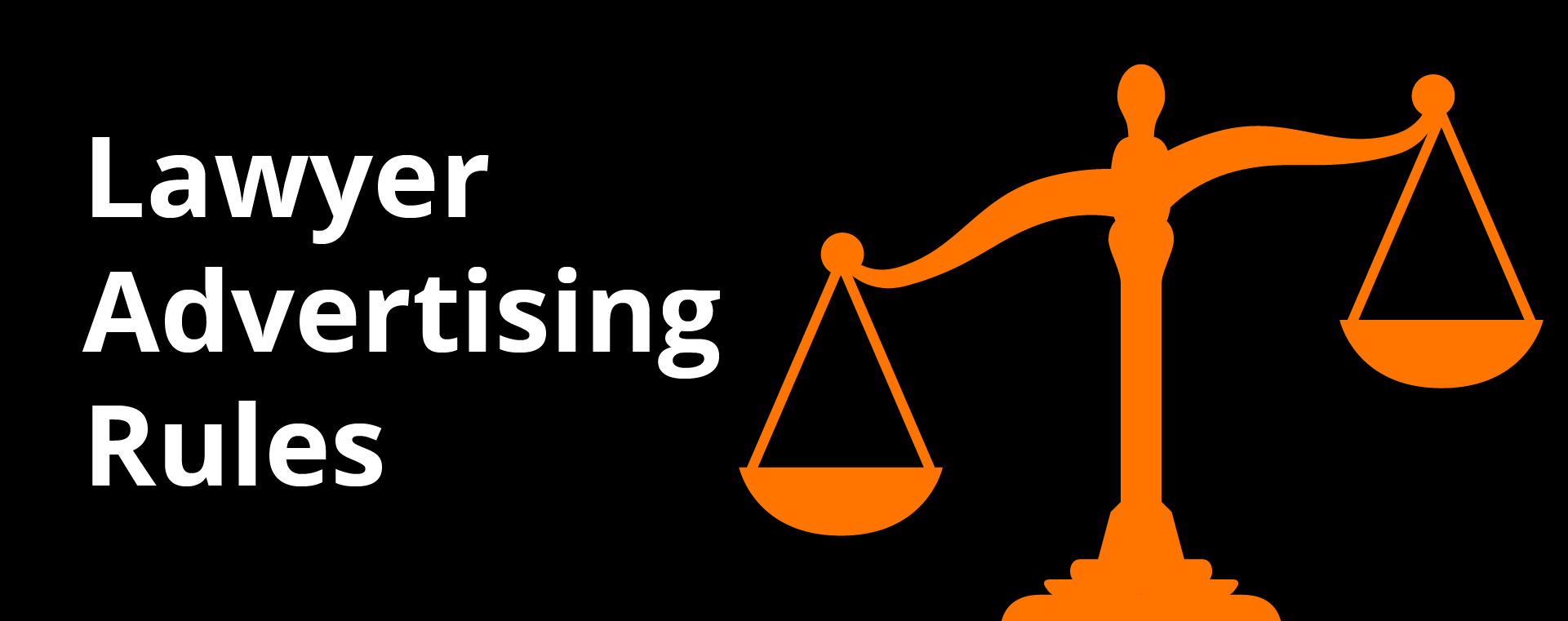Lawyer Advertising Rules: Navigating Legal Marketing with Confidence
Stepping into the world of lawyer advertising rules, the legal landscape may seem like a labyrinth with its myriad of rules and regulations. Every marketing piece must follow strict ethical standards set by the American Bar Association (ABA) and individual state bar associations, from online ads to social media posts. These rules aren’t just about avoiding penalties—they’re about earning client trust, building credibility, maintaining professional integrity, and positioning your law firm for long-term success.
In this guide, we’ll walk through the most important legal advertising rules, explain how to stay compliant across marketing channels, share actionable strategies for ethically promoting your firm in a competitive marketplace, and explore the fine line between effective marketing and ethical conduct.
Table of Contents
- Understanding the Regulations for Lawyer Advertising
- What’s at Stake: Why the Lawyer Advertising Rules Matter
- 3 Key Principles for Ethical Attorney Advertising
- Marketing Strategies for Law Firms
- Monitoring and Evaluating Your Advertising Campaigns
- Partnering with Marketing Professionals
- Frequently Asked Questions
Key Takeaways
- Legal marketing is regulated by both the ABA and individual state bar associations. Rules cover what lawyers can say in ads, including disclosures about fees, areas of practice, and board certification claims.
- Ethical advertising requires truthfulness, transparency, and client confidentiality. Misleading content or breach of privacy can result in serious professional consequences.
- Digital and traditional marketing methods must align with these advertising rules. This includes search engine optimization (SEO), social media, content creation, and print advertising. All promotional efforts must align with ethical and legal standards while enhancing law firm visibility and client acquisition.
Understanding the Regulations for Lawyer Advertising
Law firms need to grasp attorney advertising regulations to pursue legal services appropriately. The American Bar Association and State Bar Associations have developed extensive rules around attorney advertising to ensure the legal profession remains ethical and trustworthy. Lawyers who follow these rules are also protected against potential repercussions. While the rules vary slightly by jurisdiction, they generally focus on preventing misleading claims, maintaining professional integrity, and protecting consumer interests.
These basic guidelines include:
- Permitting lawyers to declare their fees and promote their skills related to certain areas of law only if certified by an ABA-accredited organization approved by such organization’s territories or districts.
- Allowing them to list their name, address, email, website, phone number, services offered, fees, and other information on law firm websites.
For optimal legality, practicing attorneys should refer to their state professional conduct standards, be cognizant of the national rules formulated by the ABA, and contact respective local bars for additional insight into attorney advertising rules and laws.
American Bar Association Guidelines
The ABA’s Model Rules of Professional Conduct, particularly Rules 7.1 to 7.5, outline foundational standards for lawyer advertising and marketing:
- Rule 7.1 prohibits false or misleading communication about a lawyer or the lawyer’s services.
- Rule 7.2 permits lawyer advertising through any media but limits compensation for referrals to specific exceptions (e.g., standard ad costs, certified referral services, reciprocal agreements with disclosures). It also requires ads to include the name and contact info of at least one responsible lawyer or law firm.
- Rule 7.3 restricts solicitation, particularly live person-to-person contact, when the motive is financial gain, unless directed at other lawyers, close contacts, or certain business professionals. It also bans solicitation involving coercion or targeting people who have opted out.
- Rule 7.4 has been folded into other rules; References to specializations now fall under Rule 7.2, which allows lawyers to state they are certified specialists only if certified by an approved or ABA-accredited organization and clearly identifying the certifying body.
- Rule 7.5 has been removed. Guidance on firm names and letterheads is now covered under Rule 7.1’s prohibition on misleading communication.
- Rule 7.6 prohibits lawyers or law firms from accepting government legal engagements or judicial appointments if they made political contributions for the purpose of obtaining such positions.
These lawyer advertising guidelines keep legal marketing activities from featuring false or misleading statements that could harm consumers, otherwise called “false and deceptive.” Sharing material misrepresentations regarding the law or facts is strictly forbidden under these regulations to preserve clients’ interests above all else.
By setting up these basic lawyer advertising rules, the ABA allows attorneys and those they serve in society to rest assured that their best interests will be respected throughout interactions.
State Bar Association Rules
Law firms must understand the attorney advertising regulations of each state bar association, as state bar associations often add their own spin to the ABA’s model. As a result, lawyer advertising is governed by the laws of the state where the advertising occurs, not necessarily where the attorney or firm is based. For example:
- New York requires attorneys to retain copies of all ads for at least three years.
- California mandates that lawyers keep ads for two years and prohibits certain endorsements unless clearly identified.
- Some states require pre-approval of ads, especially for TV or radio.
Lawyers must use caution when claiming expertise and specializations in their ads, as such assertions will only be valid if they come from approved programs certified by the relevant state bar associations. Any ambiguity with television and radio advertisements requires first submitting them for review by the respective authorities at the local level—i.e., the relevant State Bar Association(s).
Bottom Line: Always check both ABA and local bar requirements before advertising. Even well-intentioned ads can lead to trouble if they don’t align with jurisdiction-specific rules.
50-State Guide to Attorney Advertising Rules
To help you stay compliant and confident in your advertising, we’ve put together a comprehensive guide covering all 50 states. In this resource, you’ll find:
- A full breakdown of attorney advertising rules for every state
- Direct links to each jurisdiction’s official Rules of Professional Conduct
- State-specific requirements like record retention policies, mandatory disclaimers, and ad filing or approval mandates
View Our Complete Guide to State-by-State Attorney Advertising Rules
If you have questions about your state’s requirements or need help adapting your marketing to meet them, do not hesitate to reach out. We’ve helped countless law firms find the right path (and avoid costly missteps).
What’s at Stake: Why Lawyer Advertising Rules Matter
The rules governing legal advertising and solicitation weren’t created arbitrarily. They stem from a long history of attempts to preserve the integrity of the legal profession.
In the 19th century, a rapid increase in attorneys, driven by lax admission standards by bar associations, led to fierce competition and a flood of aggressive, often misleading advertising. This environment contributed to declining public trust in lawyers and their services.
In response, the ABA adopted the 1908 Canons of Professional Ethics, which formally condemned lawyer advertising as unethical. States quickly followed suit, enacting laws that banned or strictly limited legal marketing altogether. For much of the 20th century, lawyers were barred from advertising, and even where it was permitted, the restrictions were intense.
That changed in 1977 with the landmark Supreme Court case Bates v. State Bar of Arizona, which affirmed that attorneys have a First Amendment right to advertise, provided it’s done ethically and without misleading the public.
Today’s ABA Rules, including those in Rule 7, are built on that legacy. They aim to balance transparency and professionalism, ensuring lawyers can inform the public about their services without undermining trust or exploiting vulnerable clients. As advertising methods continue to evolve, so do these guidelines, but their core purpose remains the same: to protect the public while upholding the dignity of the legal profession.
The Growing Importance of Ethical Compliance Today
With digital opportunities, law firm advertising has more ways to reach potential clients than ever. However, this greater visibility comes with heightened scrutiny. Ethical compliance is a vital part of protecting legal licenses, reputations, and clients’ trust.
Non-compliant or misleading advertising can result in serious consequences, including:
- Disciplinary action from your state bar
- Fines, suspension, or even disbarment
- Long-term reputational damage, eroding client confidence and community trust
As legal marketing channels continue to evolve, the margin for error grows thinner. Compliance with the specific state’s and ABA’s lawyer advertising rules when marketing across social media, pay-per-click ads, SEO, and more will help maintain ethical standards and a competitive edge.
3 Key Principles for Ethical Attorney Advertising
Ethical marketing is about following rules, but more importantly, it’s about building trust. The guidelines that govern attorney and law firm advertising are designed to ensure accuracy, fairness, and transparency in how legal services are presented to the public. The principles below form the foundation for responsible legal marketing and help protect both clients and the profession’s integrity.
1. Truthfulness and Transparency
Legal marketing necessitates truthfulness and transparency to remain successful, as deceitful or inaccurate legal advertisements can lead to significant civil and criminal penalties. A positive law firm reputation is also drastically affected by how truthful they are in advertising. Open communication contributes significantly toward establishing trust between potential clients and firms.
In short, your ads must tell the truth. That means:
- No exaggerations (“The #1 trial lawyer in America!”)
- No guarantees of results (“We will win your case”)
- No unverifiable claims (“Most aggressive attorney in the city”)
Instead, be transparent, honest, and specific about what you have to offer. Highlight credentials, explain your process, and let testimonials speak for themselves (within the rules). Truthful advertising builds trust, and that’s what clients are really hiring.
2. Protecting Client Confidentiality
Protecting client confidentiality is of the utmost importance in marketing, but it is particularly critical in legal marketing. Lawyers are responsible for upholding professional ethics, prohibiting them from revealing information about their clients without consent. Breaching these rules risks disciplinary action by the legal profession, which can ruin lawyer-client trust.
When advertising your law firm, NEVER:
- Share identifying client details without written consent
- Include recognizable case details in testimonials or case studies without anonymization
- Disclose results that could inadvertently identify a client
When in doubt, seek explicit permission, or keep all case details general. Violating confidentiality risks disbarment and damages a firm’s credibility.
3. Avoiding Unfounded Specialization Claims
Claiming to be a “specialist” or “expert” in a field of law is often only allowed if you’re certified by an approved entity. Without proper credentials, using vague descriptor terms like “focused on” or “experienced in” may be safer and more accurate.
For example, rather than “We are the top-certified family law specialists,” you could say, “Our firm focuses on family law and divorce cases” if your law firm does not have proper accreditation.
Misleading specialization claims can result in sanctions or disciplinary action, even if unintentional.
Marketing Strategies for Law Firms
Marketing a law firm online opens up tremendous opportunities, expanding reach and bringing in new business. Ethical digital marketing balances visibility with professionalism, ensuring outreach efforts align with all applicable lawyer advertising rules.
When done correctly, a well-thought-out digital approach helps increase visibility for any law firm’s website and draw more clientele.
Building a Law Firm Marketing Strategy
Whether your goal is to attract new clients or generate qualified leads for a specific type of case, every successful legal marketing plan starts with the same foundation: finding the right people and connecting with them in the right way.
To do that, you need more than just ads. You need a clear, well-defined strategy. That means:
Define Your Business Goal
Are you looking to drive more high-value cases? Build a stronger pipeline of plaintiffs? Gain visibility in a competitive market? Clear goals shape the direction of your marketing and ensure you invest your resources wisely.
Identify Your Target Audience
Who are you trying to reach? What are their needs, concerns, and motivations? Knowing who they are and where they spend their time helps you focus your efforts and messaging for the greatest impact.
Map the Customer Journey
Understand how potential clients go from “I think I need a lawyer” to “I’m hiring this law firm.” This includes awareness, research, consultation, and ultimately, conversion. Through user data and analytics, you can get an accurate picture of these behaviors for more educated decision-making.
Pinpoint Your Marketing Touchpoints
Where do people interact with your firm? Think search engines, social media, referrals, directories, and offline sources. Every touchpoint is an opportunity to build—or lose—trust.
Structure a Basic Marketing Funnel, or Go Further With a Flywheel
Align your marketing tactics with the funnel stages: awareness, consideration and conversion. If the budget is tight, prioritize the bottom-of-the-funnel efforts so prospects are closer to making a decision.
You can take your structure a step further and follow the marketing flywheel. This model still drives conversions, but helps your firm even more by encouraging clients to essentially become promoters, spreading the word to others about your firm for word-of-mouth referrals.
Clarify the Value You Offer at Each Stage
Every legal service delivers something different, sometimes emotional, sometimes practical. When creating your advertising messages, speaking to what your audience truly values is crucial, such as:
- Personal Injury: Urgency, ease, and privacy
- Wrongful Death: Compassion, justice, and clarity
- Contract Disputes: Authority, precision, and fast resolution
Launch Campaigns That Align With Your Strategy
Once you’ve mapped out a strategy, choose tactics that support your goals, resonate with your audience, and deliver real value across every channel.
Commonly Used Marketing Tactics
Your strategy should now be rooted in clear business goals, so now it’s time to determine which marketing tactics directly support that strategy. The following are some of the most widely used and effective legal marketing tactics today. Each has its strengths, but overall campaign success depends on how well these tactics are executed.
Search Engine Optimization (SEO)
Show up when it matters most. Search engine optimization is a valuable resource for law firms wishing to raise their visibility and attract potential customers through natural search results. Key elements of SEO for law firms involve tactics such as:
- Developing high-quality content with relevant keywords
- Optimizing local service pages
- Leveraging tools like Google Business Profiles
- Building credible links between websites
SEO is a long-term investment, but one that keeps paying off when done right.
Pay-Per-Click Advertising (PPC)
Want faster visibility? Well-targeted PPC campaigns for lawyers on platforms like Google Ads can drive immediate traffic. Choose the right keywords, avoid budget waste, and craft compelling ad copy that converts clicks into consultations.
Social Media Marketing
From Facebook to LinkedIn, Instagram, and YouTube, social media marketing lets you meet people where they already are. Paid promotions increase reach, while organic posts foster trust and humanize your brand. This is especially valuable for building top-of-mind awareness.
Content Marketing
Effective messaging through content marketing and a successful digital strategy can illustrate law firms as reliable authorities, helping them attract prospective clients. Content marketing can be used in various ways to establish oneself as a knowledgeable authority, including:
- Offering practical tips on how local people can benefit from consulting your law firm
- Focusing efforts on amplifying brand recognition and presence
- Establishing SMART goals together with storytelling aspects linked directly back to the business identity
- Leveraging SEO-related techniques to increase organic website visits
- Implementing social media plans directed at expanding reach when interacting online
Having persuasive material that looks deep into end users’ issues or questions will encourage prospects seeking legal services to use your firm’s solutions.
Public Relations (PR)
Press features, expert commentary, and speaking opportunities elevate your authority and credibility. PR enhances your reputation and can boost SEO by earning backlinks from respected media outlets.
Traditional Advertising Methods for Lawyers

Print Marketing
Yes, print marketing can still work. Direct mailers, brochures, and magazine ads can be highly effective in specific regions or niche markets because they offer a more tangible, credible sense. Print cuts through digital noise and often conveys credibility, especially with older or offline audiences. The key is to place ads in relevant publications like newspapers or industry magazines to reach the target audience. Print materials can also be more effective when combined with other online marketing practices like SEO, email campaigns, social media strategies, and content creation. Ensure your messaging is clear on how your law firm can serve consumer needs while supporting all other promotional initiatives for optimal results.
Billboards, Television Spots, & Radio Ads
Billboards, TV spots, and radio ads remain relevant in certain practice areas like personal injury, criminal defense, or class actions. These formats can drive high-volume awareness—just be sure your messaging and audience targeting are dialed in.
Outdoor advertisements and billboards generate strong brand visibility, reaching potential clients you may not have access to through digital channels. These advertising methods also increase local recognition while boosting the lawyer’s services to other media outlets. For efficient use, law firms should craft concise headlines of six words or less that stand out from the crowd and create attractive visuals so people will quickly notice their law firm ads. Following all specific rules set by State Bar Associations, including displaying a physical office address, is important, too.
Monitoring and Evaluating Your Advertising Campaigns
As the advertising industry evolves rapidly, observing and measuring the success of your marketing campaigns is essential. Not only does this aid in determining which methods are most effective, but it also ensures adherence to record retention regulations.
Monitoring and assessing your ads helps law firms learn what works best so they can revise their strategies accordingly, such as evaluating if direct mail or email marketing has better response rates. This will enable them to make smarter decisions when formulating future plans for marketing purposes.
Record Retention Requirements
Law firms must understand the rules and regulations regarding record retention and legal advertising in their respective states. In New York, attorneys are mandated to keep copies of advertisements for at least three years after being released, while those from California must maintain a true copy or recording of any communication used concerning a lawyer’s services or in marketing for two full years. Any disregard for these laws could result in disciplinary actions by the relevant State Bar Association, making adherence essential.
Tracking Campaign Performance
For law firms, effectively monitoring the performance of their marketing campaigns is a vital part of any successful strategy. With solutions like HubSpot, Adobe Marketo Engage, and automation software available, it’s easy for businesses in this sector to gain insights into how well they promote themselves. This gives them an understanding of which strategies have been more profitable so that decisions can be made based on data-driven analysis and help enhance future results.
Partnering with Marketing Professionals
As legal advertising becomes ever more complex, law firms are teaming up with law firm marketing professionals to keep abreast of the situation. A specialized law firm agency in the domain can provide tailored services such as content development and online presence maintenance, which are essential for drawing new customers or growing an existing firm’s customer base. They assist in staying informed about emerging trends and exploiting creative solutions to set oneself apart from other businesses competing within this field.
Selecting the Right Marketing Agency
When a law firm is searching for the best marketing agency, it must consider various factors to ensure its decision is most effective. These include the prospective company’s reputation, costs associated with it, and communication styles, along with how familiar it is with advertising regulations in legal settings. To back this up, past performance should be reviewed by studying cases similar to that of your own establishment within the legal sector, where such an organization has delivered successful results as evidence of success rates.
Finding out if these legal marketing agencies understand what will drive maximum efficiency from your business regarding ad campaigns needs to be addressed, too. So, communicating which strategies suit you or responding quickly when contacted are crucial skills any prospective professional body ought to possess. It’s also wise.
Firms should check how long said enterprise has been operating, preferably showing extensive knowledge of working across multiple jurisdictions over several years. Choosing appropriate partners can have lasting effects on financial stability and promotional prowess, either way, so the analysis here becomes paramount in making informed decisions about outcomes!
Ensuring Compliance and Collaboration
The importance of compliance and collaboration between the law firm and its marketing agency cannot be overstated to ensure ethical advertising practices are followed and maximum results are achieved. Working with a marketing partner, legal professionals can benefit from increased brand recognition, sincere efforts for honest promotion campaigns, and building trustworthiness within their target audience, all essential parts needed to adhere to standards on responsible advertising.
Ensure that all conditions comply appropriately while working cohesively towards joint objectives, such as elevating market visibility or potentially generating leads. Here are a few practical tips law firms should implement:
- Concisely communicate expectations regarding advertisement compliance requirements.
- Often monitor progress made via ad projects.
- Evaluate outcomes attained accordingly.
- Preserve documents demonstrating that these endeavors have been done correctly through record-keeping protocols.
Collaborative work relationships need nurturing, too. Creating collaborative atmospheres where both entities strive happily towards one goal will enable smoother processes, leading to quicker success rates down the line.
Avoid Costly Mistakes & Stay Compliant: Work with an Experienced Law Firm Marketing Agency
The journey through legal advertising has been enlightening, from understanding lawyer advertising rules to exploring ethical attorney advertising principles, from leveraging digital marketing strategies to traditional advertising methods, and from monitoring and evaluating advertising campaigns to partnering with a law firm marketing agency. As we navigate the intricate labyrinth of legal marketing, it’s clear that understanding and adhering to the legal advertising rules is not just a matter of compliance but a cornerstone of building trust and credibility with clients. And in the end, isn’t that what legal practice is all about – building trust and safeguarding justice?
Frequently Asked Questions
Can lawyers advertise on social media?
Advertising on social media is a great way for lawyers to get new clients. It’s one of the most effective methods to attract fresh customers.
Are lawyers allowed to advertise in the USA?
Lawyers in the United States are permitted to promote their services, given they abide by the rules of the American Bar Association and their state’s Rules of Professional Conduct..
Was there a time when lawyers could not advertise?
It’s been more than four decades since the U.S. Supreme Court made its landmark ruling in Bates v State Bar of Arizona, lifting the limits on attorney advertising and paving the way for lawyers to advertise their services ever since. This revolutionary decision brought about a fundamental shift in how legal professionals market themselves, permitting access through advertisements that help customers quickly and conveniently find out what they need from state bar-licensed attorneys quickly and conveniently (as long as the aforementioned rules are followed).
What is the difference between attorney advertising and solicitation?
Attorney advertising is directed at the public as a whole, in contrast to solicitation, which focuses on specific people or organizations and is more tightly regulated.
What are the regulations for lawyer advertising?
Legal advertising must comply with the ethical standards stipulated by both state and American Bar Associations. This includes ensuring the accuracy of the information, specifying details as required, and preserving client confidentiality. These regulations are important for safeguarding a high level of integrity in legal promotion conducted across all state bar associations’ jurisdictions.






